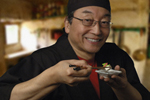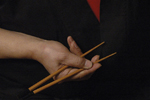 “Snow Falling on Cedars” (1999) has been on my film viewing list forever. After seeing it today, I feel it is a shame that I waited so long. Judging from reviews and how well it did at the box office, and knowing how Americans might see it as somewhat “messy” plot-wise, I can see why it hasn’t been given it’s due, but for me it was a near perfect cinematic experience.
“Snow Falling on Cedars” (1999) has been on my film viewing list forever. After seeing it today, I feel it is a shame that I waited so long. Judging from reviews and how well it did at the box office, and knowing how Americans might see it as somewhat “messy” plot-wise, I can see why it hasn’t been given it’s due, but for me it was a near perfect cinematic experience.
 “Snow Falling on Cedars” takes place on an island off the coast of Washington state, in the early 1950’s during a blizzard. A trial is about to take place for the murder of Carl, a local fisherman of Nordic-American descent, by another fisherman resident, Kazuo, of Japanese-American descent. The two men, although friends and fellow workers, were embroiled in a dispute over a tract of land that was deeded over to Carl’s family at the time that Japanese-Americans were interned in concentration camps at the start of WWII. Motive exists, but motive alone does not always guarantee guilt.
“Snow Falling on Cedars” takes place on an island off the coast of Washington state, in the early 1950’s during a blizzard. A trial is about to take place for the murder of Carl, a local fisherman of Nordic-American descent, by another fisherman resident, Kazuo, of Japanese-American descent. The two men, although friends and fellow workers, were embroiled in a dispute over a tract of land that was deeded over to Carl’s family at the time that Japanese-Americans were interned in concentration camps at the start of WWII. Motive exists, but motive alone does not always guarantee guilt.
To add to the situation, Kazuo’s wife, Hatsue, has a history, since childhood, with a local small newspaper reporter, Ishmael, who is covering the trial. Carl has died under curious conditions by a blow to head, followed by drowning. A coroner has testified that a blow to Carl’s head was caused by a kendo strike. Kendo is Japanese sword fighting, practiced with wooden swords. This is circumstantial evidence against Kuzuo, who has been trained in kendo by his father. Kuzuo’s defender, Nels Gundmundsson attempts to fight the still rampant hatred against post-war Japanese-Americans to find justice for Kuzuo.
 Part of what makes “Snow Falling…” work so well is the inherent claustrophobia of the situation, from the outside-in: an island is isolated further by a snowstorm. Most of the drama of the present takes place in a courtroom, further narrowing the present-day story to a very select time and place. This frees the story to a series of flashbacks from the past of each character to flesh out how each of them arrived to the present, presenting clues about each of their lives, as well as those pertinent to the trial. In these flashbacks, we discover the romance between Ishmael and Hatsue from early childhood in pre-war conditions. Hatsue’s mother is against a union between the two youths, and steers Hatsue towards a Japanese match, while Ishmael’s father, himself a newspaper reporter and publisher, advocates the rights of the Japanese-Americans. As war breaks out, Kuzuo’s father is forced to deed his land off before he and his family is forced into internment in California. At the internment camp, Hatsue meets Kuzuo and having told Ishmael that her love for him is impossible, she marries Kuzuo.
Part of what makes “Snow Falling…” work so well is the inherent claustrophobia of the situation, from the outside-in: an island is isolated further by a snowstorm. Most of the drama of the present takes place in a courtroom, further narrowing the present-day story to a very select time and place. This frees the story to a series of flashbacks from the past of each character to flesh out how each of them arrived to the present, presenting clues about each of their lives, as well as those pertinent to the trial. In these flashbacks, we discover the romance between Ishmael and Hatsue from early childhood in pre-war conditions. Hatsue’s mother is against a union between the two youths, and steers Hatsue towards a Japanese match, while Ishmael’s father, himself a newspaper reporter and publisher, advocates the rights of the Japanese-Americans. As war breaks out, Kuzuo’s father is forced to deed his land off before he and his family is forced into internment in California. At the internment camp, Hatsue meets Kuzuo and having told Ishmael that her love for him is impossible, she marries Kuzuo.
Now rivals, both Ishmael and Kuzuo go off to war, but to very different arenas: Ishmael to the Pacific, to (oddly) fight the Japanese, Kuzuo to Europe (most likely in one of the Nisei units) to fight Germans. Both return wounded: Ishmael almost drowns and loses an arm as well as his heart with Hatsue’s rejection. Kuzuo is wounded by being haunted of having unjustly killed a young German soldier.
Normally, flashbacks in movies are a clumsy device, but “Snow Falling…” does it very well, using sounds and images that trigger the flashbacks of each person, and as such, the movie addresses the very nature of perceptions and memories, and how extremely important both are to witnesses in a trial of law. As Hatsue says, when being grilled by the District Attorney, “Trials aren’t only about truth, even though they should be…”
 One reason “Snow Falling…” has not reached popular appeal is because it is hard to classify: is “Snow Falling…” a period piece, a love story, a courtroom drama, a mystery? It actually is all of these. There is also the untidy and unfamiliar character traits (to Hollywood-ized viewers) that the leads have: we want Hatsue to love the “right” man (Ishmael) but her love is in question and consequently she marries Kuzuo. We want Ishmael to follow in his father’s honorable footsteps, but this legacy is questioned even by Ishmael, himself. Even the innocence of Kuzuo is suspect when he admits he did want to kill Carl. In a lot of ways, “Snow Falling…” is most like “To Kill a Mockingbird” in tone and message. but while the “…Mockingbird” story is more distilled down, “Snow Falling on Cedars” is much better produced and much more interesting. Both films address doing the honorable deed for all the right reasons.
One reason “Snow Falling…” has not reached popular appeal is because it is hard to classify: is “Snow Falling…” a period piece, a love story, a courtroom drama, a mystery? It actually is all of these. There is also the untidy and unfamiliar character traits (to Hollywood-ized viewers) that the leads have: we want Hatsue to love the “right” man (Ishmael) but her love is in question and consequently she marries Kuzuo. We want Ishmael to follow in his father’s honorable footsteps, but this legacy is questioned even by Ishmael, himself. Even the innocence of Kuzuo is suspect when he admits he did want to kill Carl. In a lot of ways, “Snow Falling…” is most like “To Kill a Mockingbird” in tone and message. but while the “…Mockingbird” story is more distilled down, “Snow Falling on Cedars” is much better produced and much more interesting. Both films address doing the honorable deed for all the right reasons.
As far as courtroom dramas, “…Mockingbird” and “Snow Falling…” are neck and neck. Our courtrooms should be the arena where the best of our laws (and indeed the best of our very natures) should be most evident, yet sadly they are not always. This is shown when the District Attorney sums up his case against Kuzuo,
“Look clearly at the defendant. See the truth, self-evident in him…Consider his face. Ask yourself, each one of you: ‘What is my duty as a citizen of this community? Of this country? As an American?'”
As rebuttal, the defense lawyer, Gundmundsson (played wonderfully by Max von Sydow) tells the jury,
“‘Look at his face,’ the prosecutor said, presuming that you will see an enemy there…Now, our learned prosecutor will have you do your duty as Americans…You may think that this is a small trial, in a small place. Hmm? Well. It isn’t. Every once in a while, somewhere in the world, humanity goes on trial. And integrity. And decency. Every once in a while, ordinary people just like you, ladies and gentlemen, get called on to give the report card for the human race!”
































